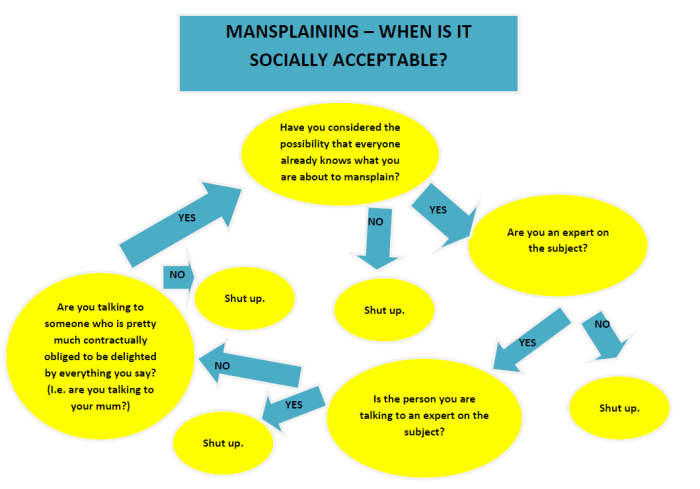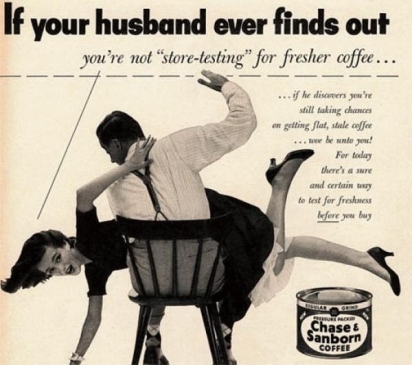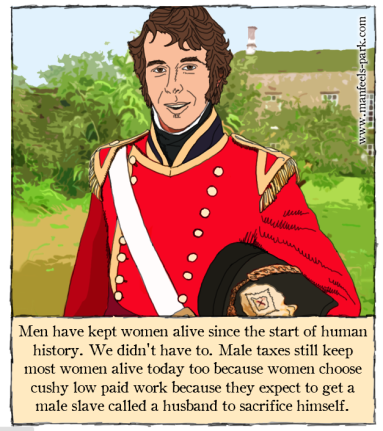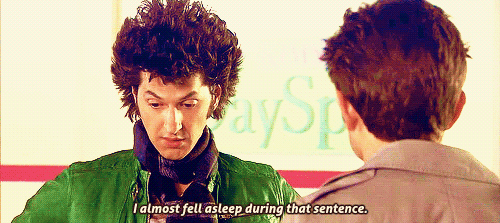By Bloody but Unbowed
My friend’s post yesterday, about the female hysteria feedback loop, led me to ponder another instance of mansplaining – the party-based mansplaining – which leads to a phenomenon I like to think of as the polite female listener.
How often do you end up, at a party, listening to a dude droning on and on about something in which you are not particularly interested? The dude talks at length on a topic about which you are by no means uninformed or lacking opinions, but which this dude renders completely uninteresting by his rampant condescension. Your eyes glaze over, your head lolls to one side, and you resemble nothing so much as a dead badger at the side of the road – flat, limp, and out of it.
Recently I was at a party with a female friend with whom I have often discussed this phenomenon. We ended up talking to this dude, who duly went off on a long, would-be-instructive rant. Staring at the table, nearly in tears from the sheer tedium of the monologue and the effort of not letting on how bored I was, I found myself thinking, “This can’t be happening? SURELY we can’t both sit here, silently accepting this guy’s barrage of condescending tripe, after we have discussed, on so many occasions, this very phenomenon?”
So why do we do this? Why don’t we just tell a man being boring that we would, actually, given the chance, rather spend the evening reading an 800-page treatise on East German taxation rates that listen to him mansplaining? It would surely be better for everyone – women wouldn’t have to suffer alarming levels of tedium, and men wouldn’t continue to make arses of themselves.

Why does the dude not notice that you are completely uninterested in his soliloquy? Because you have been successfully trained as a polite female listener. Men are socialised to talk, and women to listen, which means that many – not all – dudes simply do not notice female boredom. They mistake silence for interest, and keep talking, while the woman suppresses vivid internal visions of strangling the dude with the table cloth or dropping cyanide into his glass – ANYTHING to get him to shut up.
Now, before you go off on a not-all-men rant, let us acknowledge that yes, women mansplain too. But, in the words of Rebecca Solnit, “The out-and-out confrontational confidence of the totally ignorant is, in my experience, gendered. Men explain things to me, and other women, whether or not they know what they’re talking about”. Don’t believe me? Ask any human woman of your acquaintance.

One key contributing factor to the phenomenon of the polite female listener is men’s implicit assumption that they are more knowledgeable, on any topic, than a woman, by virtue of their sex. Another is the fact that women have been socialised to be polite, however boring, rude, or egomaniacal the man she happens to be talking to is. Politeness is often imperative not only to maintain a pleasant atmosphere, but to stave off violence. Stories of men resorting to violence and even murder when faced with a perceived rejection are too common to be considered mere coincidence.
Possibly these deeply ingrained gendered behaviours stem from those dark times when women were financially dependent on men, and needed to keep them in good humour at all costs. The Swedish historian Eva Helen Ulvros, who has conducted extensive studies of women’s letters from the 18th and 19th centuries, writes, in the prologue to her book Kvinnors röster: Livsöden från det moderna Sveriges framväxt (an English translation follows after the citation):
“Gud vare evigt lof för det Du är så nöjd med mig – vad det är ljuft att veta sig vara till den grad älskad af den man så hjertligt värderar.” De orden finns att läsa i ett brev från Helena, född Billberg men i första äktenskapet gift Hollström, i Alnaryd i Blekinge till fästmannen Vilhelm Faxe i Lund, daterat till den 15 augusti 1806. Citatet speglar hur viktigt det var för en kvinna att bli bekräftad av en man. Brevet skrevs för mer än tvåhundra år sedan, men uppfattningen att en kvinnas värde var beroende av mäns gillande kan kännas tidlös.
(“God be praised that you are so pleased with me – it is sweet to know oneself to be so loved by a person one esteems so warmly.” These words appear in a letter from Helena, née Billberg but in her first marriage taking the name Hollström, in Alnaryd in county Blekinge to her fiancée Vilhelm Faxe in Lund, dated 15 August 1806. The quote reflects how important it was for a woman to be validated by a man. The letter was written over two hundred years ago, but the notion that a woman’s value depends on the approval of men may appear to be timeless.)
This is a totally unscientific supposition, but my guess is that the inexplicable politeness of women in the face of tedious men stems from the days – not so far gone – when our very survival literally depended on the ability to fake enthusiasm. Anyone reading Pride and Prejudice will be struck by the enormous energy expended by the Bennet sisters in trying to remain polite to Mr Collins, despite his vacuity of mind and staggering sense of self-importance. In their world, the only acceptable career for a woman is marriage, and though none of the Bennet sisters wishes to marry Mr Collins themselves, they yet have to show him respect, however little he deserves it. In the 1995 dramatisation of Pride and Prejudice, Mrs Bennet, when she realises that Elizabeth has refused Mr Collins’s proposal, envisages the family being “left to starve in the hedgerows” as a result. The ability to put up with a man’s ways was, not that long ago, necessary to ensure a woman’s survival, and perhaps that of her entire family.

A woman’s place was in the home, while the public sphere belonged to men. Education, politics, literature, and history, were all the domains of men. Another Jane Austen character, Anne Elliot, illustrates my point when she says, in Persuasion, “Men have had every advantage of us in telling their own story. Education has been theirs in so much higher a degree; the pen has been in their hands”. The world as we know it was shaped by men – perhaps it is no wonder that some men still think women aren’t really part of it, and don’t understand it.
Men’s opposition to women gaining access to universities, and the employment market, in the late 19th and early 20th centuries, was often fierce, brutal, and carefully organised. The Swedish lawyer Elsa Eschelsson, for instance, was bullied to the point of suicide by men opposed to women’s participation in society. Women demanding the right to vote were imprisoned, starved, beaten and sexually assaulted. Women presuming the right to voice their opinion are still threatened and harassed, and even daring to enter a public space often results in sexual harassment.

Virginia Woolf perhaps said it best when she wrote, “A woman must have money and a room of her own if she is to write fiction”. This means, to me, that in order to participate in society on an equal footing with men – to influence literature, culture, and legislation – women have to be men’s equals economically.
Women have had to fight hard to access education, suffrage, and the ability to control fertility and earn a living (although they still get paid less than men for doing the same work). We have come far on the road to gender equality, but there is still a long way to go. And cultural change takes time. Mansplaining, as my friend put it, is endemic. At the moment, it seems there is nothing we can do except recognise it. We live in a world where men’s perceived entitlement leads to up to seventy percent of women suffering physical and/or sexual violence from an intimate partner in their lifetime. Women have to negotiate all the different manifestations of male violence every day, in every social environment, and asking a man to stop talking is often not an option.
Our foremothers taught their daughters to fake enthusiasm for male vanity, and they taught them well. Hopefully, as we make ever greater gains in gender equality, gender roles will be erased and boy children will not be encouraged to think of themselves as experts on every damn subject just because they have a penis, and girl children will not be forced to fake admiration for people less knowledgeable than them. Hopefully, in the not-too-distant future, the phenomenon of the polite female listener will be but a faint memory from darker, drearier times.

P.S. For a video illustrating the concept of women finding their place in society, have a gander at Harry Enfield’s Women: Know Your Limits.
P.P.S. Is this where I add the compulsory caveat about how actually I don’t hate men, and have many delightful male friends? Anyway, I don’t, and I do.
